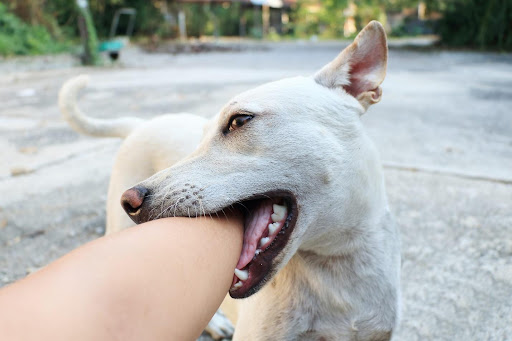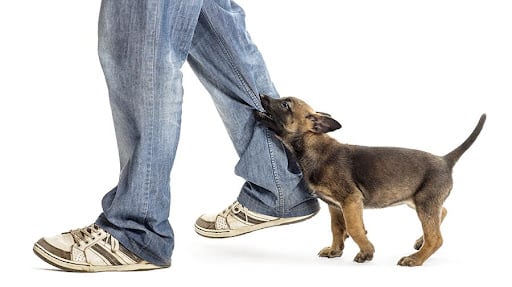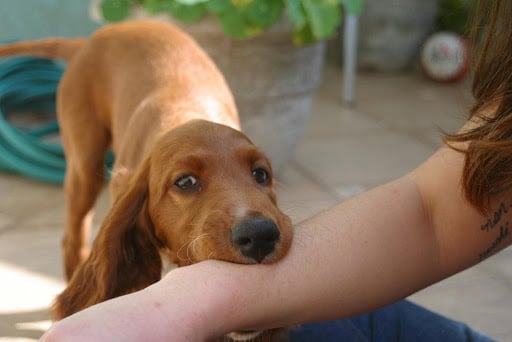Biting, nipping, and mouthing are all natural behaviors for dogs, particularly when they’re excited or playful. However, these behaviors can be problematic if not addressed early on. If your dog is biting when excited, it’s essential to understand the root causes and take the necessary steps to correct this behavior. In this comprehensive guide, we’ll explore why dogs bite when excited, how to differentiate between normal and problematic biting, and most importantly, how to stop this behavior effectively.
Understanding Why Dogs Bite When Excited
Dogs, especially puppies, explore the world with their mouths. It’s how they learn about their environment, communicate with other dogs, and engage in play. However, while mouthing and nipping are typical behaviors, they can become problematic if not managed properly.
Playfulness and Excitement
Dogs often bite when they’re overly excited or during play. This behavior is rooted in their instincts, as puppies often play bite with their littermates. However, what might be playful to a dog can be painful and dangerous to humans.
Lack of Bite Inhibition
Bite inhibition refers to a dog’s ability to control the force of its bite. Puppies typically learn this from their mothers and littermates. If a puppy bites too hard, the other puppy might yelp and stop playing, teaching the biter to be gentler. If this lesson is not learned during puppyhood, the dog may continue to bite hard into adulthood.
Herding Instincts
Certain breeds, like Border Collies and Australian Shepherds, are bred for herding and may nip at heels or feet as part of their instinctual behavior. This can be particularly problematic around children who are more likely to be on the receiving end of these nips.
Overstimulation
Dogs that become overly excited can sometimes lose control of their behavior, leading to biting. Overstimulation can occur during intense play, when meeting new people, or in high-energy environments.
Fear or Anxiety
In some cases, biting can be a sign of fear or anxiety. A dog that feels threatened or scared may bite as a defensive mechanism.

Ways to Stop Your Dog from Biting When Excited
Stopping a dog from biting requires a combination of training, patience, and consistency. Here are some effective strategies to address this behavior:
1. Teach Bite Inhibition
Bite inhibition is a critical skill that all dogs should learn. This involves teaching your dog to control the force of their bite. Even if your dog is just playing, it’s important they know how to be gentle.
- Yelp and Withdraw: When your dog bites you, even if it’s gentle, let out a high-pitched yelp or say “ouch!” and immediately withdraw your attention. This mimics the behavior of other puppies and teaches your dog that biting ends the fun. After a few moments, resume play, and repeat the process if necessary.
- Time-Outs: If yelping doesn’t work, give your dog a time-out. Stop play immediately and leave the room for a few minutes. This helps your dog associate biting with losing your attention, which is something they value.
2. Provide Appropriate Chew Toys
Dogs need to chew, so it’s essential to provide them with appropriate items to chew on. Redirect your dog’s mouthing behavior to chew toys instead of your hands or clothes.
- Variety of Toys: Offer a variety of toys that are safe and durable. Toys made of rubber, nylon, or rope are excellent choices. You can also use puzzle toys that dispense treats to keep your dog mentally stimulated and focused on something other than biting.
- Frozen Toys: For teething puppies, offer frozen chew toys. The cold can soothe their gums and provide relief, reducing the urge to bite.
3. Encourage Non-Contact Play
Non-contact games like fetch or “find it” can help burn off excess energy without encouraging biting.
- Fetch: Play fetch with your dog using a ball or frisbee. This allows them to chase and retrieve without the need for physical contact.
- Hide and Seek: Hide treats or toys around the house or yard and encourage your dog to find them. This game stimulates your dog mentally and physically, helping to reduce excitability.
4. Use Positive Reinforcement
Positive reinforcement is one of the most effective ways to train your dog. Reward good behavior with treats, praise, and affection.
- Reward Gentle Play: When your dog plays gently or follows commands without biting, reward them immediately. This reinforces the idea that gentle play leads to positive outcomes.
- Ignore Bad Behavior: If your dog starts to nip or bite, ignore them completely. Don’t make eye contact, speak to them, or touch them. After a few seconds, you can redirect their attention to a toy or command them to sit or lie down.
5. Avoid Rough Play
While it might be tempting to engage in roughhousing with your dog, especially with larger breeds, it can encourage biting and other aggressive behaviors.
- Calm Play: Stick to calm, controlled games that don’t involve wrestling or tugging on your clothes. This helps your dog understand that biting is not a part of playtime.
- Teach Commands: Teach your dog commands like “leave it” or “drop it” to help control their impulses during play. Practice these commands regularly to ensure they’re effective in various situations.
6. Socialize Your Dog
Socialization is crucial in preventing and managing biting behaviors. Expose your dog to different people, environments, and other dogs to help them learn appropriate behaviors.
- Puppy Classes: Enroll your puppy in socialization classes where they can learn to interact with other dogs and people in a controlled environment.
- Controlled Playdates: Arrange playdates with other well-behaved dogs to help your dog learn how to play without biting.
7. Implement Time-Outs
If your dog becomes overly excited and starts biting, implement a time-out.
- Crate Time: Gently place your dog in their crate or a designated quiet space to allow them to calm down. Ensure the crate is not used as punishment but as a safe space for your dog to relax.
- Short Breaks: If your dog starts nipping during play, stop immediately and give them a short break. This helps them understand that biting leads to an end to fun activities.
8. Monitor Energy Levels
Sometimes biting occurs because a dog has excess energy and doesn’t know how to release it. Ensuring your dog gets enough physical and mental exercise can help reduce biting behaviors.
- Regular Exercise: Take your dog for regular walks, runs, or play sessions to burn off energy. A tired dog is less likely to engage in unwanted behaviors like biting.
- Mental Stimulation: Incorporate puzzle toys, training sessions, or interactive games into your dog’s routine to keep them mentally stimulated.
9. Seek Professional Help
If your dog’s biting behavior is severe or you’re struggling to manage it on your own, consider seeking help from a professional dog trainer or behaviorist.
- Dog Trainers: A professional dog trainer can provide personalized training sessions to address specific issues like biting. They can also teach you techniques to reinforce positive behavior at home.
- Behaviorists: If your dog’s biting is linked to fear, anxiety, or aggression, a certified animal behaviorist can help identify the underlying causes and develop a treatment plan.

Common Mistakes to Avoid When Training
While training your dog to stop biting, it’s important to avoid certain mistakes that can hinder progress or worsen the behavior.
- Yelling or Punishing: Yelling at or physically punishing your dog for biting can actually reinforce the behavior. Dogs may see yelling as a form of attention or become fearful, which can lead to more aggressive behaviors.
- Inconsistency: Training requires consistency. Ensure that everyone in your household follows the same rules and training methods to avoid confusing your dog.
- Ignoring the Root Cause: Understanding why your dog is biting is crucial. If the behavior is linked to anxiety, fear, or medical issues, addressing these underlying causes is essential for effective training.
Advanced Techniques for Severe Cases
If basic training methods aren’t effective, you may need to employ more advanced techniques.
- Desensitization: Gradually expose your dog to the stimuli that trigger biting, starting at a low level and slowly increasing intensity as your dog becomes more comfortable. Pair exposure with positive reinforcement to change your dog’s emotional response to the trigger.
- Counter-Conditioning: Change your dog’s negative associations with certain triggers by pairing them with something positive, like treats or playtime.
- Clicker Training: Use a clicker to mark desired behaviors, followed by a reward. This method can be particularly effective for teaching impulse control and bite inhibition.
When to Seek Veterinary Advice
In some cases, biting behavior may be linked to underlying medical issues. If your dog suddenly starts biting or if the behavior worsens despite training, consult your veterinarian.
- Pain or Discomfort: Dogs in pain may bite as a way of protecting themselves. Conditions like dental issues, arthritis, or injuries can cause discomfort, leading to biting.
- Neurological Issues: In rare cases, neurological problems can cause behavioral changes, including aggression or increased excitability.
- Hormonal Changes: Hormonal imbalances, particularly in unspayed or unneutered dogs, can lead to behavioral changes. Your veterinarian can provide guidance on whether spaying or neutering might help with your dog’s biting behavior.
Prevention Strategies
Preventing biting behavior before it starts is ideal, especially if you have a puppy. Early intervention can save you and your dog a lot of trouble down the road.
Early Socialization
Start socializing your puppy as early as possible. The more experiences your dog has with different people, dogs, and environments, the better they’ll be at handling various situations without resorting to biting.
Obedience Training
Basic obedience training can go a long way in preventing biting. Commands like “sit,” “stay,” and “leave it” give you more control over your dog’s behavior and help establish you as the leader. Consistent training helps your dog understand what is expected of them, reducing the likelihood of biting out of excitement or confusion.
Controlled Play Sessions
Organize play sessions with well-behaved dogs to teach your puppy how to play appropriately. Always supervise these interactions to step in if biting occurs. Controlled play sessions allow your dog to learn social cues from other dogs, which can be instrumental in reducing biting behavior.
Routine and Structure
Dogs thrive on routine and knowing what to expect. Providing a consistent schedule for feeding, play, and rest can reduce anxiety and unwanted behaviors, including biting. When a dog knows what to expect, they are less likely to become overly excited or anxious, which can lead to biting.
Managing Biting in Older Dogs
If you’ve adopted an older dog or your dog’s biting behavior has persisted into adulthood, the strategies above can still be effective with some adjustments.
Patience and Persistence
Older dogs might take longer to unlearn bad habits, but with patience and consistency, they can learn new behaviors. Never give up on your dog, and stay committed to their training. Over time, even deeply ingrained behaviors can be modified.
Professional Help
Don’t hesitate to reach out to a professional if you’re struggling. An experienced trainer or behaviorist can provide invaluable insights and techniques tailored to your dog’s needs. Sometimes, an outside perspective can identify issues you may have overlooked and offer solutions that make a significant difference.
Understanding the Legal Implications of Dog Biting
It’s crucial to be aware of the legal responsibilities that come with owning a dog, especially if biting is a concern. Many states hold dog owners liable for injuries caused by their pets, even if it’s the first time the dog has bitten someone.
Strict Liability Laws
In many states, dog owners are strictly liable for any injuries their dog causes, regardless of the dog’s past behavior. This means that even if your dog has never shown aggression before, you could still be held responsible if they bite someone. It’s essential to take every precaution to prevent biting incidents, as the legal and financial consequences can be severe.
Negligence Laws
Some states operate under negligence laws, where the owner is only liable if they were careless in controlling their dog. For example, if you know your dog tends to bite when excited and you allow them to interact with people unsupervised, you could be found negligent. Being proactive in managing your dog’s behavior can protect you from legal liability.
Insurance Considerations
If your dog is prone to biting, it’s wise to check your homeowner’s or renter’s insurance policy to ensure you’re covered for dog-related incidents. Some policies may exclude certain breeds or require additional coverage. Ensuring you have adequate coverage can provide peace of mind in case of an incident.

Building a Strong Relationship with Your Dog
At the core of preventing and managing biting behavior is the bond between you and your dog. A strong, positive relationship based on trust and respect will make training easier and more effective.
Spend Quality Time Together
Building a bond with your dog requires spending time together in positive, low-stress situations. Whether it’s going for a walk, playing, or simply relaxing together, quality time strengthens your connection. A dog that feels secure and loved is less likely to engage in biting behaviors.
Understand Your Dog’s Needs
Every dog is different, and understanding your dog’s specific needs is key to preventing biting. Pay attention to what triggers your dog’s biting behavior and adjust your training and management strategies accordingly. Tailoring your approach to your dog’s unique personality and needs will yield the best results.
Positive Reinforcement
Always use positive reinforcement to encourage good behavior. Praise, treats, and affection go a long way in teaching your dog what behaviors are desirable. Positive reinforcement not only teaches your dog what to do but also strengthens your bond, making them more likely to want to please you.
Stopping your dog from biting when excited is a process that requires patience, consistency, and a deep understanding of your dog’s behavior. By implementing the strategies outlined in this guide, you can effectively manage and reduce your dog’s biting behavior, ensuring a safer and more enjoyable relationship between you and your furry friend. Remember, training is an ongoing process, and the more effort you put into it, the better the results will be.
If you find that you’re struggling to control your dog’s biting, don’t hesitate to seek help from a professional trainer or behaviorist. With the right approach and support, even the most challenging behaviors can be overcome.
Contact Scoopology for Your Puppy
At Scoopology, we understand the challenges that come with training your dog, especially when it comes to managing biting behavior. Our team of experienced dog trainers is here to help you and your dog achieve a harmonious relationship. Whether you’re dealing with a playful puppy or an adult dog with persistent biting issues, we offer personalized training programs tailored to your dog’s specific needs.
If you’re ready to take the next step in managing your dog’s biting behavior, contact us today. We offer consultations, one-on-one training sessions, and group classes to help you and your dog succeed. Let us help you turn your dog’s behavior around so you can enjoy a happier, safer, and more fulfilling bond with your furry friend.
For more information or to schedule a consultation, please visit our website at Scoopology.com or call us at (360) 612-7667. We’re here to help you and your dog every step of the way.

